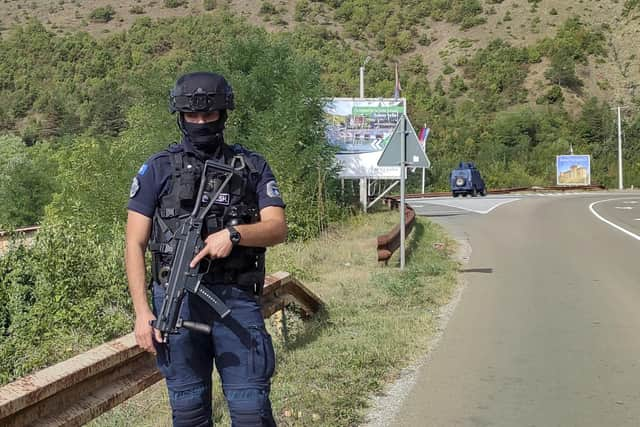Kosovan police surround 30 armed gunmen in monastery after ‘terrorist attack’
Kosovan police surrounded 30 armed gunmen in a monastery hours after a police officer was killed and another wounded in a “terrorist attack” Kosovo’s authorities blamed on support from neighbouring Serbia.
Kosovo's prime minister Albin Kurti said the group was in a monastery in the northern village of Banjska and urged them to surrender.
Advertisement
Hide AdAdvertisement
Hide Ad"There are at least 30 people heavily armed. They are professionals, with military and police background," he said.


Earlier on Sunday he said "masked professionals armed with heavy weapons" opened fire on a police patrol in the village of Banjska, Leposavic, 35 miles north of the capital Pristina at 3am, killing one officer. Another officer was injured but his condition is not life-threatening.
Kosovo police said two lorries with no licence plates had blocked a bridge at the entrance of the village. Three police units were sent to unblock it but came under fire from different positions with different weapons, hand grenades and bombs.
Police managed to push back the attack and take two injured police officers to the hospital in southern Mitrovica.
One of them was dead on arrival, doctors said.
Speaking after a meeting of the country's Security Council on Sunday, Mr Kurti said it was a "sad day" for Kosovo and named the dead police officer as Afrim Bunjaku.
The prime minister displayed a set of photos which showed a number of vehicles without licence plates and an armoured personnel carrier "which does not belong to the Kosovo police", near the Orthodox monastery in Banjska.
The area around Mitrovica, in northern Kosovo, is where most of the country's ethnic Serb minority lives, in four municipalities.
Mr Kurti said that gunfire against police with different weapons was ongoing.
Advertisement
Hide AdAdvertisement
Hide Ad"The government of the Republic of Kosovo and its state institutions are ready and co-ordinated to respond to crime and criminals, terror and terrorists," he said.
Kosovo's president Vjosa Osmani, who is in New York at the United Nations General Assembly, denounced the killing and the "attacks against the Republic of Kosovo's sovereignty".
"Such attacks testify once again the destabilising power of the criminal bands organised from Serbia which for a long time .. are destabilising Kosovo and the region," she said.
Serbia's parliamentary speaker Vladimir Orlic said Mr Kurti "was quick to blame the Serbs," adding that Mr Kurti was the one who wanted an "escalation" in the field.
Earlier this month, an EU-facilitated dialogue meeting in Brussels between Mr Kurti and Serbian President Aleksandar Vucic ended in acrimony.
In February, the EU put forward a 10-point plan to end months of political crises. Mr Kurti and Mr Vucic gave their approval at the time, but with some reservations that have still not been resolved.
The EU warned both countries that the commitments that Serbia and Kosovo made in February "are binding on them and play a role in the European path of the parties," which refers to their chances of joining the 27-nation bloc.
In May tensions in northern Kosovo left 93 peacekeepers hurt in riots.
Advertisement
Hide AdAdvertisement
Hide AdSerbia and its former province, Kosovo, have been at odds for decades. Their 1998-99 war left more than 10,000 people dead, mostly Kosovo Albanians. Kosovo declared independence in 2008 but Belgrade has refused to recognise the move.
Comments
Want to join the conversation? Please or to comment on this article.
